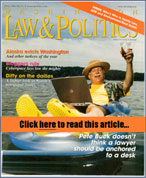Pete Buck believed that a good culture accounted for happy, highly productive employees who, in turn, contributed to the success of our clients. We always maintained our culture statement in writing and we pledged to review this statement at least once a quarter to remind ourselves of its importance. The elements applicable to a sole practitioner, remain, e.g. #1.
1. We did great work for our clients: This was the foundation of our firm and its success. Serving our clients’ needs was our top priority. We hired great attorneys, planners, paralegals, and staff to provide high quality work. We trained our people to achieve this standard. We worked as a team to generate ideas and support one another in order to generate only work of the highest caliber. We always remembered that achieving our clients’ goals is the touchstone of our firm. This did from time-to-time trump our balanced lives. When necessary for the client, we worked long days and long weeks. If we could not maintain balanced lives while meeting the highest standards, we immediately curtailed taking new clients. Over commitment was never an excuse for delayed work product or less than excellent work.
2. We were a collaborative, hard-working, fun-loving team: We had a team focus, not a self-focus. Each player had a valuable role. We collaborated and helped each other. We shared clients. We strived for satisfaction and success for everyone at the firm. We laughed a lot. We were quick to notice, to acknowledge, to congratulate, to celebrate, and to care.
3. We trained: We placed a high value on training everyone to do a better job professionally. We also provided training on a number of personal fronts such as communication, creativity, leadership, tools of success, etc. We constantly looked for ways to encourage and to challenge employees and new attorneys. We assumed retention.
4. We expected excellence, creative problem solving, and professionalism in our work, but understood that did not mean perfection: We helped everyone achieve excellence in their work by providing necessary training. We looked for out-of-the box solutions, listened to each other’s suggestions, and were open to new ways of doing things. We learned from and forgave mistakes. We didn’t blame. We asked for help when we needed it.
5. We were egalitarian and inclusive; not hierarchical: No one on the team used power or position to get what they wanted.
6. We were civil: We were kind and respectful of everyone in the office, our clients, our colleagues, opposing counsel, and opposing parties. We solved interpersonal problems or disagreements through direct and honest communication – even when this was awkward or difficult.
7. We sought honesty and integrity in our actions and our communications: Honesty was not only the best policy, it was the expected policy. Honesty and integrity were necessary components of our mutual respect. We did not tolerate dishonesty in any form.
8. We valued balance in each of our lives at work and outside of work: We strived to attain balance for timekeepers and staff by setting reasonable annual hours expectations. In the case of timekeepers, this was 1600 billable hours per year. We provided reduced hours for parental leave or personal need. We recognized that a healthy and happy life outside of work helps achieve satisfaction and performance while at work. We provided a sincere safety net for each other in times of personal need or crisis. We encouraged each other to be active and healthy.
9. We were generous: We strived to be givers, not takers. Decisions were made based on what was good for the whole rather than for individual gain. We did not fail to do the right thing concerning an employee simply because “we didn’t have to.” In other words, we did not fail to make an associate or a lateral hire a partner in a timely fashion simply because they were not expecting or demanding it. Excellent pay for hours worked is paramount to our culture. We were generous with our time and resources to employees and the greater community at large.
10. We were fiscally conservative as a firm and encouraged our people to be so personally: We avoided pressure to work long hours or to compromise our generosity by avoiding high overhead in the firm and in our personal lives. We want to be financially successful, but making top dollar was not the driving force in our firm culture.
11. We were small and entrepreneurial: We celebrated our smallness. We had limited bureaucracy. We were flexible, nimble, and inclusive in our decision-making. We were not bound by bureaucracy or official procedure and were able to take advantage of opportunities when they arose, whether expected or not.
12. We were conscious of our community: We supported numerous charities, as demonstrated by our giving and volunteer work. We supported the provision of legal services to the underrepresented, as demonstrated by 100% participation in voluntary pro-bono efforts. We supported diversity in the legal profession, as demonstrated by Pete’s groundbreaking creation of a diversity internship and training program. We supported “green,” as demonstrated by our office. We supported fair trade as demonstrated by our purchase of fair trade products.
13. We had fun: We had a high energy, intelligent, creative staff. We had great clients. We took advantage of our good fortune to enjoy our professional lives together.
On several occasions, Pete has written about the history of establishing a successful balanced lifestyle firm and the ins and outs of his attempts to do so. One paper was a snapshot set of observations in 2006.

